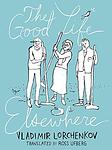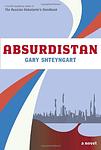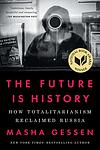The Greatest Russian, Austrian "Contemporary" Books of All Time
Click to learn how this list is calculated.
This list represents a comprehensive and trusted collection of the greatest books. Developed through a specialized algorithm, it brings together 305 'best of' book lists to form a definitive guide to the world's most acclaimed books. For those interested in how these books are chosen, additional details can be found on the rankings page.
Genres
Contemporary books are a genre that focuses on stories set in the present day, often exploring current social, cultural, and political issues. These books are typically written in a modern style and often feature relatable characters dealing with real-life situations. Contemporary books can cover a wide range of topics, from romance and family drama to coming-of-age stories and thrillers. The genre is constantly evolving to reflect the changing world we live in, making it a popular choice for readers who want to stay up-to-date with the latest trends and issues.
Countries
Date Range
Reading Statistics
Click the button below to see how many of these books you've read!
Download
If you're interested in downloading this list as a CSV file for use in a spreadsheet application, you can easily do so by clicking the button below. Please note that to ensure a manageable file size and faster download, the CSV will include details for only the first 500 books.
Download-
1. Extinction by Thomas Bernhard
"Extinction" is a novel that explores the dark and complex themes of family, identity, and history through the eyes of its protagonist, a professor living in Rome. When he receives news of the deaths of his parents and brother in a car accident, he is forced to confront his past and his Austrian heritage. The narrative delves into his thoughts and feelings, his criticisms of his family and society, and his philosophical musings on life and death, all while he prepares to return to his family's estate for the funeral. The novel is renowned for its dense, stream-of-consciousness style and its unflinching examination of the human condition.
The 1416th Greatest Book of All Time -
2. Concrete by Thomas Bernhard
The book is a darkly introspective narrative that delves into the mind of a reclusive, obsessive intellectual who is struggling to complete his scholarly work on the composer Mendelssohn. As he grapples with his own ailments and the perceived mediocrity of his surroundings, the protagonist's stream-of-consciousness monologue reveals his deep-seated anxieties, self-loathing, and profound isolation. The narrative is a relentless examination of the protagonist's psyche, showcasing his critical view of society and his own personal relationships, which are fraught with tension and dysfunction. Through this, the novel explores themes of artistic creation, intellectual elitism, and the suffocating nature of expectations and familial obligations.
The 1733rd Greatest Book of All Time -
3. Woodcutters by Thomas Bernhard
Woodcutters is a darkly humorous critique of Vienna's artistic elite. The story takes place over the course of a single evening, as the narrator attends a dinner party in honor of a recently successful actor. As the evening progresses, he reflects on the pretentiousness and hypocrisy of the guests, the mediocrity of their artistic achievements, and the tragic suicide of his former lover. The novel is a scathing indictment of the vanity and self-delusion of the artistic community.
The 1741st Greatest Book of All Time -
4. The Clay Machine-gun by Victor Pelevin
"The Clay Machine-gun" is a surreal and complex novel that explores the nature of reality and illusion. The story is set in post-Soviet Russia and follows a protagonist who has multiple identities, including a poet in 19th-century Russia, a 20th-century psychiatric patient, and a 21st-century advertising executive. The narrative moves between these identities and realities, blurring the lines between them and creating a layered and philosophical exploration of Russian society, identity, and the human psyche.
The 2266th Greatest Book of All Time -
5. Wittgenstein's Nephew by Thomas Bernhard
"Wittgenstein's Nephew" is a semi-autobiographical novel that explores the friendship between the narrator and his friend Paul, who is the nephew of the famous philosopher Ludwig Wittgenstein. The story takes place in Vienna and is set against the backdrop of the Austrian mental health system. The novel delves into themes of sanity, insanity, and the fine line that separates the two, while also offering a critique of Austrian society. It is a meditation on the nature of illness, both physical and mental, and the impact it has on personal relationships and one's perception of the world.
The 3003rd Greatest Book of All Time -
6. A Sorrow Beyond Dreams by Peter Handke
This book is a poignant exploration of the author's mother's life and her struggle with depression, ultimately leading to her suicide. It provides a deeply personal and raw account of the author's attempts to understand his mother's despair and the societal constraints that contributed to it. The narrative is a profound reflection on memory, loss, and the complexity of human emotions, offering a stark and moving portrayal of a woman's life in a rigid, post-war society.
The 3042nd Greatest Book of All Time -
7. The Loser by Thomas Bernhard
"The Loser" is a philosophical novel that revolves around the complex relationship between three friends who are all piano virtuosos. The narrative is driven by the protagonist's obsession with his friend's suicide, which he believes was triggered by the realization that they could never surpass the genius of their third friend. The book delves into the protagonist's psyche as he grapples with themes of talent, ambition, failure, and the destructive power of comparison.
The 5720th Greatest Book of All Time -
8. The Good Life Elsewhere by Vladimir Lorchenkov
"The Good Life Elsewhere" is a darkly humorous and satirical novel that follows a group of Moldovan villagers who embark on a chaotic journey to Italy in search of a better life. Through their misadventures, the author exposes the harsh realities of poverty, corruption, and the desperate measures people are willing to take in pursuit of a brighter future. With a blend of absurdity and poignant social commentary, the novel offers a compelling exploration of the human condition and the universal desire for a better life.
The 6700th Greatest Book of All Time -
9. Absurdistan by Gary Shteyngart
"Absurdistan" is a satirical novel by Gary Shteyngart that follows the story of Misha Vainberg, a wealthy and overweight Russian-American who finds himself stuck in the fictional country of Absurdistan after his father's death. The country is on the brink of a civil war, and Misha must navigate his way through the corrupt and absurd political landscape to get back to America and reunite with his love interest. Along the way, he encounters a cast of eccentric characters and experiences the absurdity of life in a country where everything seems to be falling apart.
The 7041st Greatest Book of All Time -
10. Slow Homecoming by Peter Handke
The book in question is a lyrical exploration of themes such as identity, memory, and the sense of belonging through a series of interconnected narratives. It follows the journey of an unnamed protagonist who, after a period of self-imposed exile, embarks on a quest for self-discovery and reconnection with his homeland. Through his travels, he reflects on his past experiences, the landscapes he traverses, and the people he encounters, all of which contribute to his gradual understanding of home not just as a physical place, but as a complex tapestry of relationships, history, and inner peace. The narrative is characterized by its introspective tone and vivid, poetic descriptions of both the inner and outer worlds the protagonist navigates.
The 8067th Greatest Book of All Time -
11. The Mountain And The Wall by Alisa Ganieva
"The Mountain and the Wall" is a thought-provoking novel set in a fictional region of Russia, where a massive wall is being constructed to separate the Muslim population from the rest of the country. Through the eyes of various characters, the book explores the impact of this division on individuals and communities, delving into themes of identity, religion, and the struggle for freedom. As tensions rise and conflicts erupt, the story highlights the complexities of human relationships in a divided society.
The 8223rd Greatest Book of All Time -
12. Rock, Paper, Scissors And Other Stories by Maxim Osipov
"Rock, Paper, Scissors And Other Stories" is a collection of captivating short stories that delve into the lives of ordinary people in a small Russian town. Through these interconnected tales, the author explores themes of love, loss, and the complexities of human relationships. With a keen eye for detail and a deep understanding of the human condition, the stories in this book offer a poignant and thought-provoking glimpse into the lives of individuals navigating the challenges of modern-day Russia.
The 9004th Greatest Book of All Time -
13. F Letter: New Russian Feminist Poetry by Galina Rymbu, Eugene Ostashevsky, Ainsley Morse
"F Letter: New Russian Feminist Poetry" is a captivating collection of contemporary Russian feminist poetry that challenges societal norms and explores themes of gender, identity, and power. Through the powerful and thought-provoking verses of Galina Rymbu, Eugene Ostashevsky, and Ainsley Morse, this anthology sheds light on the experiences and perspectives of women in Russia, offering a unique and refreshing voice in the world of literature.
The 9279th Greatest Book of All Time -
14. The Future Is History: How Totalitarianism Reclaimed Russia by Masha Gessen
This book provides a deeply researched examination of the resurgence of totalitarianism in Russia, focusing on the lives of four individuals born at what promised to be the dawn of democracy. The book explores how, after the fall of the Soviet Union, instead of moving towards a democratic society, Russia has seen a rise in a new form of totalitarianism under its current leadership. It delves into the psychological shift in the Russian populace, the government's use of homophobia as a method of control, and how the internet and social media have been weaponized for political purposes.
The 9613th Greatest Book of All Time
Reading Statistics
Click the button below to see how many of these books you've read!
Download
If you're interested in downloading this list as a CSV file for use in a spreadsheet application, you can easily do so by clicking the button below. Please note that to ensure a manageable file size and faster download, the CSV will include details for only the first 500 books.
Download












